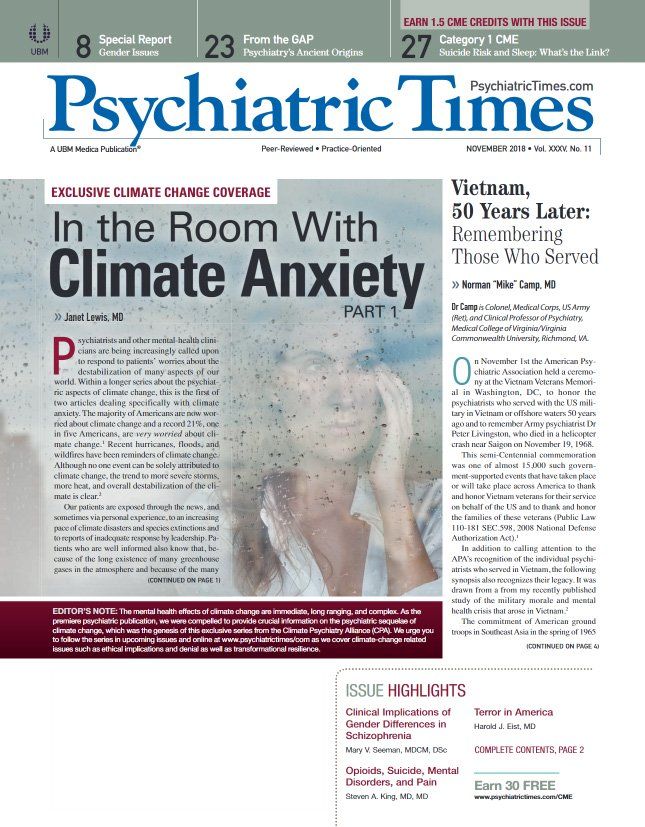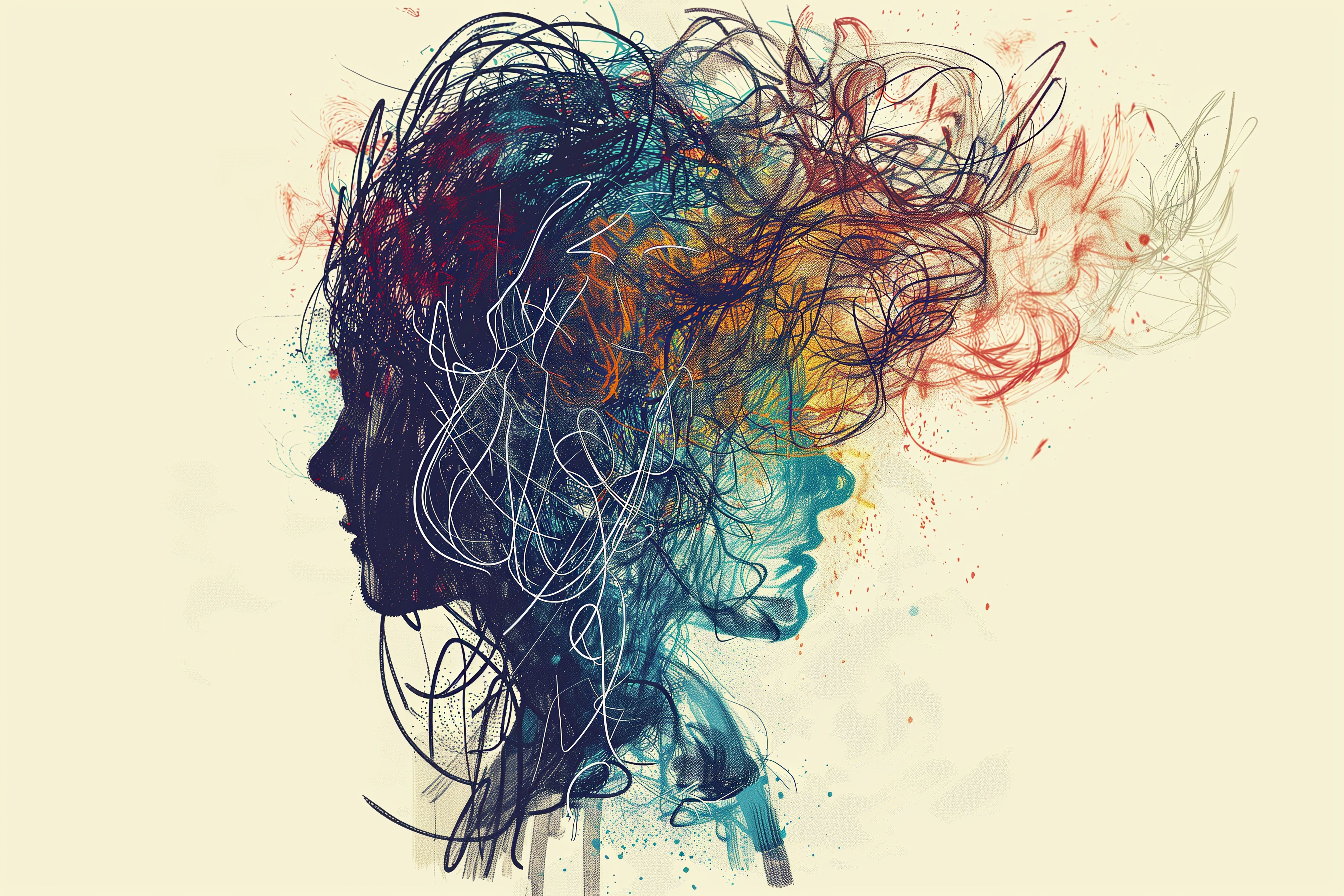Publication
Article
Psychiatric Times
Vietnam, 50 Years Later: Remembering Those Who Served
Author(s):
The mental health challenges that arose in Vietnam over the course of the war were in many respects both prodigious and unprecedented. An estimated 200 psychiatrists, including two women, served in Vietnam with the Army, Navy, and Air Force between 1964 and 1973.
©KeithTarrier/Shutterstock

Dr Camp is Colonel, Medical Corps, US Army (Ret), and Clinical Professor of Psychiatry, Medical College of Virginia/Virginia Commonwealth University, Richmond, VA.
On November 1st the American Psychiatric Association held a ceremony at the Vietnam Veterans Memorial in Washington, DC, to honor the psychiatrists who served with the US military in Vietnam or offshore waters 50 years ago and to remember Army psychiatrist Dr Peter Livingston, who died in a helicopter crash near Saigon on November 19, 1968.
This semi-Centennial commemoration was one of almost 15,000 such government-supported events that have taken place or will take place across America to thank and honor Vietnam veterans for their service on behalf of the US and to thank and honor the families of these veterans (Public Law 110-181 SEC.598, 2008 National Defense Authorization Act).1
In addition to calling attention to the APA’s recognition of the individual psychiatrists who served in Vietnam, the following synopsis also recognizes their legacy. It was drawn from my recently published study of the military morale and mental health crisis that arose in Vietnam.2
The commitment of American ground troops in Southeast Asia in the spring of 1965 was purportedly done to aid our ally, South Vietnam, in defending itself from an armed takeover by its communist neighbor, North Vietnam. But the war turned out to be far more challenging and costly than anticipated and resulted in a strategic defeat, if not a tactical one. The eight years of fighting in Vietnam involved almost 2.6 million American servicemen and women and produced 47,400 combat deaths and over 350,000 additional wounded in action. In fact, US casualty numbers for Vietnam eclipsed those for World War I (321,000) and were double those for the Korean War (158,000). Compared with the more recent wars in Iraq and Afghanistan, the Vietnam War produced roughly 7.5 times as many US military deaths from all causes as occurred in these two theaters combined.
An estimated 200 psychiatrists, including two women, served in Vietnam with the Army, Navy, and Air Force between 1964 and 1973. Among the roughly 135 who served with the Army (66% of the troops in Vietnam), two-thirds were drafted civilians-citizen soldiers-while the remainder received their psychiatric training in military residency programs. Most psychiatrists served a single 12- to 13-month deployment. Dr Peter B. Livingston was the only fatality, and he is remembered on the Vietnam Veterans Memorial Wall.
The mental health challenges that arose in Vietnam over the course of the war were in many respects both prodigious and unprecedented. During the first half of the war, the deployed psychiatrists treated, or supervised treatment of, a wide but manageable array of psychiatric conditions, but they saw surprisingly small numbers of combat exhaustion cases (ie, traumatic combat stress reaction cases), compared with the numbers from earlier wars.
Cases that did arise were effectively treated, at least by military standards, by specialized and non-specialized psychiatric personnel applying the traditional military forward treatment doctrine (ie, brief, simple treatments such as safety, rest, wound care, and physical replenishment; peer support; and opportunities for emotional catharsis, all applied as close to the soldier’s unit as practical and accompanied by expectations of rapid recovery of duty, even combat, function). In many instances these treatments were augmented with psychotropic medications.
In time, and resonant with the growing anti-war movement, civilian psychiatrists began to question whether the soldiers so treated were at greater risk in subsequent combat or were more vulnerable to developing delayed psychiatric conditions as veterans. Whereas these doubts were new in the modern history of military psychiatry, the concerns were never systematically addressed.
As the war lengthened, mounting evidence suggested that the enemy’s guerrilla strategy and tactics, the bloody, ambiguous, and often discouraging nature of the fighting, and the rising opposition to the war at home, were causing increasing numbers of low-grade psychological and psychosomatic reactions as well as behavior disorders such as heavy drug use (typically marijuana at that point) and excessive combat aggression. Some deployed psychiatrists came to think that these symptoms and behaviors were collectively expressive of “partial trauma” or “strain trauma” (emotionally taxing events-singular or recurring-that were not of sufficient intensity at the time to make them disabling, but that were nonetheless psychologically injurious).
It is especially noteworthy that from the outset, military psychiatrists went to Vietnam supplied with medications not previously used on the battlefield: neuroleptics, anxiolytics, and the tricyclic antidepressants. In contrast to the sedatives that were used sparingly in earlier wars because they could produce sustained CNS depression and interfere with military performance, these new medications were widely prescribed and thought to produce salutary results. In this respect, the record reveals a great deal of improvisation in the use of these medications under unique war-time conditions.
Psychiatric matters became exponentially more difficult in the second half of the war following the enemy’s Tet Offensives in the winter of 1968 and the consequent social upheaval in the US. Opposition to the war at home rapidly accelerated to become highly charged and confrontational. Although American forces began to assume a secondary combat role to South Vietnam units, accompanied by a steady drop in casualties, the US military saw plummeting morale and widespread dissent, misconduct, racial incidents, and drug use (especially heroin). As a consequence, the Army’s psychiatric hospitalization rate quadrupled during these years compared with that in the buildup phase of the war.
In time, order and discipline became precarious as did military preparedness, while military leaders, law enforcement, and mental health services were all severely challenged. In July 1972, near the bitter end of the war, one out of every eight soldiers was medically evacuated from Vietnam for psychiatric reasons-primarily for drug dependency (especially heroin).
The war in Vietnam also brought deployed military psychiatrists a disturbing ethical dilemma rarely encountered in civilian settings. Although it had been previously recognized that the military psychiatrist was often under strain when required to help normal men adapt to an abnormal situation-that an exquisite dilemma could arise associated with the physician/psychiatrist “expecting” soldiers to return to combat following treatment-the experience in Vietnam was evidently even worse.
As military service became increasingly despised by the young troops because of the war’s intense unpopularity at home, and despair and its behavioral expressions skyrocketed, the deployed psychiatrists had only a limited capacity for making things bearable for them. And yet the soldiers believed that it was the duty of the mental health contingent to relieve them of their untenable situation.
Furthermore, colleagues at home added to the strain as an increasing number of Americans denounced the conflict in Southeast Asia. Public criticism of military psychiatry and its doctrine came from psychiatrists and other physicians who had served in Vietnam as well as from those who had not. In March 1971, 67% of American Psychiatric Association members who responded to a poll indicated that they wanted the US government to terminate all military activity in Vietnam. This was followed by a Board of Trustees resolution condemning the war and their elimination of the military psychiatry section at the annual convention.
The Action Paper passed by the APA Board of Trustees that resulted in the November 1st event at the Vietnam Veterans Memorial culminates in the following proclamation
Despite the enormous personal and professional challenges and risks these psychiatrists faced, the extant record amply demonstrates their sustained devotion to providing the best care for the troops that they could, their willingness to overcome hardship pursuant of that end, and their record of capable and commendable service. The arrival of the war’s 50th anniversary offers a unique opportunity to honor those who selflessly performed to the best of their ability what they believed was their duty to their country.
As a career Army Medical Corps officer who served a year in Vietnam as psychiatrist and director (commanding officer) of one of two fully-staffed Army psychiatric treatment units in South Vietnam, the APA’s commemorative event signifies to me-and I would venture, to my fellow psychiatrist veterans as well-a greatly appreciated if belated “welcome home.” It serves to repair our status and the record of military psychiatry in Vietnam after our having been rebuked by colleagues during and after the war for cooperating with the US military.
This article was originally published on 11/5/18 and has since been updated.
References:
1. US Department of Defense. The United States of America Vietnam War Commemoration. http://www.vietnamwar50th.com/about/commemoration_objectives/. Accessed October 24, 2018.
2. Camp NM. US Army Psychiatry in the Vietnam War: New Challenges in Extended Counterinsurgency Warfare. Ft. Sam Houston Texas: Department of the Army, Office of the Surgeon General, Borden Institute; 2015. www.bit.ly/vietnampsych. Accessed October 25, 2018. (Copies can be purchased from the Government Printing Office bookstore at https://bookstore.gpo.gov/.) â

Newsletter
Receive trusted psychiatric news, expert analysis, and clinical insights — subscribe today to support your practice and your patients.





